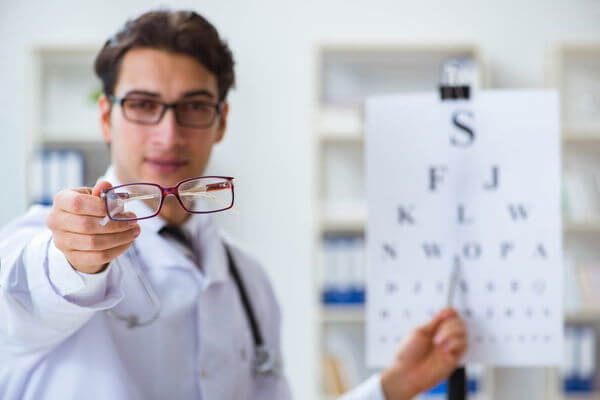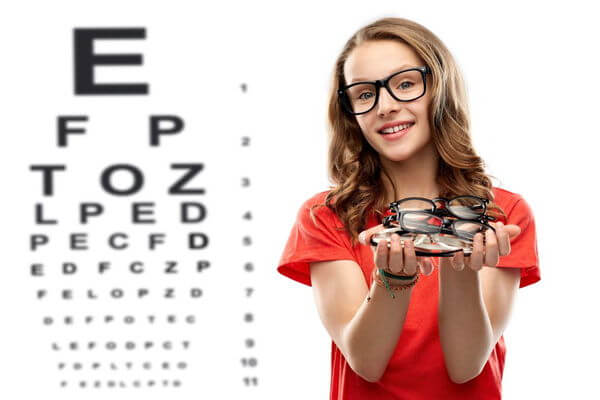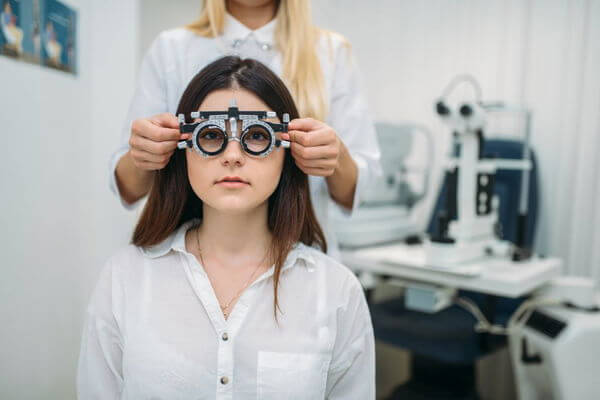As an eye care clinic dedicated to providing top-notch vision care, we often hear the question “how often should you get new glasses?” The answer isn’t one-size-fits-all, but understanding the factors that influence when to replace your glasses can help maintain optimal eye health and clear vision. Let’s explore this topic in depth, covering everything from prescription changes to fashion trends.
The importance of regular eye exams
Before diving into “how often should you get new glasses,” it’s crucial to emphasize the importance of regular eye exams. Your eye doctor can detect vision changes and eye diseases early, ensuring your prescription remains accurate and your eyes stay healthy.
The American Optometric Association recommends annual eye exams for everyone, regardless of age, as a proactive approach to eye health. Regular annual checkups can help detect and address potential eye issues early, ensuring optimal vision and eye health for individuals of all ages. For those with existing eye conditions or who wear contact lenses, more frequent visits may still be necessary based on their specific needs.
Signs It’s time for new glasses

Blurred or blurry vision
If you’re experiencing blurred vision or having trouble focusing, it may be time for new prescription glasses. Blurry vision can lead to eye strain, headaches, and difficulty with daily tasks.
Frequent headaches
Headaches, especially after reading or working on digital screens, can indicate that your current glasses are no longer suitable for your needs.
Squinting or straining
If you find yourself constantly squinting or straining to see clearly, it’s a telltale sign that you might need new lenses or an updated prescription.
Outdated prescription
Even if you’re not experiencing vision problems, the question of how often you should get new glasses depends on largely your prescription’s age. Optometrists generally recommend updating your prescription every 1-2 years.
Visible wear & tear
Scratched lenses, loose nose pads, or bent frames can affect your vision and comfort. If your glasses show significant wear, it’s time to consider a replacement.
Factors affecting how often you should get new glasses
Age
As we age, our vision tends to change more rapidly. Children and teenagers may need new glasses more frequently due to growth and development, while adults over 40 might require updates due to presbyopia.
Lifestyle changes
Starting a new job that involves more computer work or outdoor activities might necessitate different types of lenses or prescriptions.
Health conditions
Certain health conditions, such as diabetes, can affect your vision and may require more frequent prescription updates.
Fashion trends
While not a medical reason, many people choose to update their glasses to keep up with current eyewear fashion trends.
Types of glasses to consider

When it’s time for new glasses, consider these options:
- Blue light lenses: Ideal for those who spend long hours in front of digital screens.
- Prescription sunglasses: Protect your eyes from harmful UV rays while correcting your vision.
- Progressive lenses: A seamless solution for those needing correction for near, intermediate, and far vision.
- Anti-reflective coatings: Reduce glare and improve visual acuity, especially when driving at night.
The process of getting new glasses
- Comprehensive eye exam: Your eye doctor will assess your visual acuity and overall eye health.
- Prescription update: If needed, you’ll receive a new prescription for your eyeglasses or contact lenses.
- Frame selection: Choose frames that complement your face shape and lifestyle.
- Lens selection: Discuss options like scratch-resistant coatings or photochromic lenses with your optometrist.
- Fitting & adjustments: Ensure your new pair of glasses fits comfortably and provides clear vision.
The cost factor: investing in your vision
While the cost of new glasses can be a concern, it’s essential to view it as an investment in your eye health and overall wellbeing. Many insurance plans cover part of the expense, and there are often options available for various budgets.
Caring for your glasses
Proper care can extend the life of your glasses:
- Clean lenses regularly with appropriate cleaning solutions.
- Store glasses in a protective case when not in use.
- Avoid leaving glasses in hot cars or direct sunlight.
- Have your frames adjusted periodically to maintain a proper fit.
Contact lenses vs. glasses
While this article focuses on answering the question, “how often should you get new glasses,” it’s worth noting that some individuals prefer contact lenses or alternate between both. Contact lenses require more frequent replacement and different care routines, so discuss with your eye doctor which option best suits your lifestyle.
The environmental impact of eyewear
Consider donating your old glasses to charitable organizations that provide eyewear to those in need. This not only helps others but also reduces waste.
Prioritizing your vision

So, how often should you get new glasses? While there’s no universal answer, being attentive to changes in your vision, maintaining regular eye exams, and considering factors like lifestyle changes and wear and tear will help you determine when it’s time for a new pair. Remember, clear vision is crucial for your daily life and overall wellbeing, so don’t hesitate to consult with your eye doctor if you’re unsure whether you need new glasses.
At 414 Eyes, we’re committed to helping you maintain optimal vision and eye health. Whether you need a routine checkup, are experiencing vision changes, or are simply curious about new eyewear options, our team of experienced optometrists is here to assist you. Schedule an appointment today to ensure your eyes are getting the care they deserve and to find out if it’s time for a shiny new pair of glasses!
FAQs
How do I know if I should get new glasses?
Look for signs like blurry vision, eye strain, frequent headaches, visible frame damage, or an outdated prescription (over 1-2 years old). Consult your optometrist if you experience these issues.
Can I use old frames with new prescription lenses?
Oftentimes, yes. Discuss with your optometrist to ensure compatibility and consider current fashion trends.
Is having more than one pair of glasses necessary?
While not mandatory, multiple pairs offer benefits like backup options, different styles, and specialized uses (e.g., prescription sunglasses).
What factors matter when choosing new glasses?
Consider prescription requirements, your face shape, lifestyle needs, the frame material, lens options, style preferences, and budget.
Can new prescription eyeglasses help with double vision?
Sometimes, if your double vision is caused by an outdated prescription. Consult your optometrist if the issue persists.
How often should I get an eye exam if I wear glasses?
Adults: Every 1-2 years; Seniors (65+): Annually; Children: Annually or as recommended. More frequent checkups may be needed for certain conditions.
How long does an eyeglasses prescription typically last?
Generally 1-2 years for adults, but it varies. Regular eye exams ensure accurate prescriptions for good vision.
What lens coatings should I consider when replacing glasses?
Options include anti-reflective, scratch-resistant, UV-protective, and blue-light-filtering coatings. Discuss with your optometrist.
Is it okay to use old prescription glasses as a backup?
It’s not ideal for regular use due to potential eye strain and outdated prescriptions, but they can serve in emergencies.
How do optometrists determine if I need bifocals or progressive lenses?
They consider age, lifestyle, vision difficulties, and personal preferences during a comprehensive eye exam.



